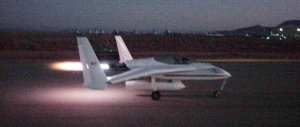|
RLV
News - Rocketry
- Future
Rocket
Racers at the Starting Line

EZ-Rocket
piloted by Dick Rutan. The modified EZ-Long plane
is powered by two 400 lb thrust XCOR Aerospace engines.
XCOR Photo.
Rocket
racing has now moved from the highly speculative to the highly
likely. In the coming year we will see vehicle flight demonstrations
at air shows and the development of racing events.
Dick Rutan, who won fame with the first non-stop,
round-the-world flight on the Voyager aircraft (now in the Air &
Space Museum), began test flying the EZ-Rocket in July 2001. The
first flight of a few hundred feet went smoothly.
The EZ-Rocket is a modified version of a EZ-Long
plane. Instead of being pushed by a propeller engine, it's hurried
along by two 400lb thrust XCOR
Aerospace engines.
X- Rocket, the Experimental Rocket Racing Association,
sent out a press
release on July 28, 2001 declaring that the EZ-Rocket would
tour the airshow circuit in 2002. The craft will lead to racing
events such as vertical drag racing. Initally, this will
involve attacks on vertical climb world records.
Rocket Shows
Edward Wright first proposed rocket racing at the
Space Frontier
Conference 9 in October 2000. As outlined in the white paper
Aerospace
Racing paper, the goal is to follow the example of air racing,
which led development of advanced aviation technology during the
1920's and 1930s when government investment in aviation was quite
small.
Even today, airshows are one of the top spectator
sports with typically several hundred thousand people coming to
see the air races, acrobatic flying, military teams like the Blue
Angels, and other exhibitions over the course of several days. The
addition of rocket vehicle events should arouse an enthusiastic
reception.
Reliable Rockets?
The EZ-Rocket will provide a testbed to develop
safe, reusable, and low cost rocket technology. A prime motivation
of the rocket racing promoters, in fact, is to demonstrate that
rocket vehicles are not inherently unsafe and unreliable.
The common perception of a rocket as always on the
hairy edge of existence comes from the many scenes over the years
of catastophic launch failures (see links to rocket
blast videos in MultiMedia.)
However, the usual cause
of a failure is not the rocket engine or motor itself but some other
component such as a flight control system. The spectacular explosions,
in turn, are primarily due to the explosives placed on a vehicle
and triggered by a range officer when it begins to go off course.
Furthermore, the failed vehicles were typically
expendable rockets on their first and only test flight. Expendables
come from a missile heritage which in turn rose from artillery.
They are built with the least amount of redundancy possible to reduce
costs while maximizing performance for their single flight. Less
than perfect reliability is inevitable under such conditions.
The partially reusable shuttle system involves both
solid rocket motors, i.e. the ones that failed on Challenger, and
liquid fueled engines. Budget restraints forced NASA to choose this
complicated hybrid system, which involves lots of tradeoffs and
narrow safety margins. The engines notoriously push the limits on
performance and many assumed initially that they must have caused
the Challenger failure.
In fact, though, rockets can be just as reliable
as jet engines when designed and operated within significant safety
margins. For example, a version of the Mirage jet fighter used by
the Swiss Air Force for decades, safely employed rocket boosters
for takeoffs from short landing strips.
Fully reusable rocket vehicles can be tested extensively
and incrementally, slowly expanding their flight envelope just as
is done with jet planes. The X-15
followed such a program for nearly a decade.
Rocket powered vehicles like the EZ-Rocket should
help both in changing the perceptions of rockets and in improving
the reusable rocket technology.
[Revised Aug.1.01]
|


